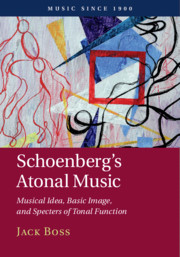‘Schoenberg's Atonal Music offers a study of the endlessly fascinating and enigmatic music Schoenberg wrote from around 1908 to roughly 1920. Jack Boss is a complete master of the music and the surrounding literature; he has an appropriate and effective analytical methodology, and he offers a synoptic understanding of these challenging musical works that greatly enriches our understanding of them. This book is an important prequel to Schoenberg's Twelve-Tone Music (Cambridge, 2014), which deservedly received the Wallace Berry award from the Society for Music Theory.'
Joseph Straus - City University of New York
‘With this provocative re-interpretation of six of Schoenberg's middle-period works, Jack Boss turns time-honored conceptions of tonality versus atonality and ‘amotivicism' on their heads. Through his vividly argued analyses grounded in motivic/set-class relations, the ‘conflict-elaboration-resolution model' of the ‘musical idea', and the use of ‘expressive' tonality, Schoenberg's Three Piano Pieces, Op. 11, reveal a novel structural identity, cohering in a unified cycle. Erwartung, previously understood as the quintessence of amotivicism, finds logic in the development of a ‘basic image', two leitmotifs representing the Lover's body and the Woman's sense of loss. With further analyses based on the concepts of ‘musical idea', ‘basic image', and ‘spectres of tonality', Boss thus propounds a fascinating revisionist history - a consistent and steady development to and from atonality, setting the stage for Schoenberg's future twelve-tone works.'
Severine Neff - Eugene Falk Distinguished Professor of Music, Emeritus, University of North Carolina, Chapel Hill
'Jack Boss’ book, Schoenberg’s Atonal Music, presents a unified, integrated, and consistent picture of the composer’s middle period compositional processes and works in contrast to the dichotomies of tonal versus atonal, atonal versus serial, and intuitive verses rational composer found in much Schoenberg scholarship. Boss creates an analytical model that links Schoenberg’s tonal, atonal, and serial compositions, demonstrates the processes found in his tonal works continue albeit transformed by new structural resources in the atonal works, and demonstrates the organicism and applicability of pitch-class set analysis as a consequence of Schoenberg’s method of working with and transforming small intervallic patterns.'
Ciro Scotto - Ohio University



